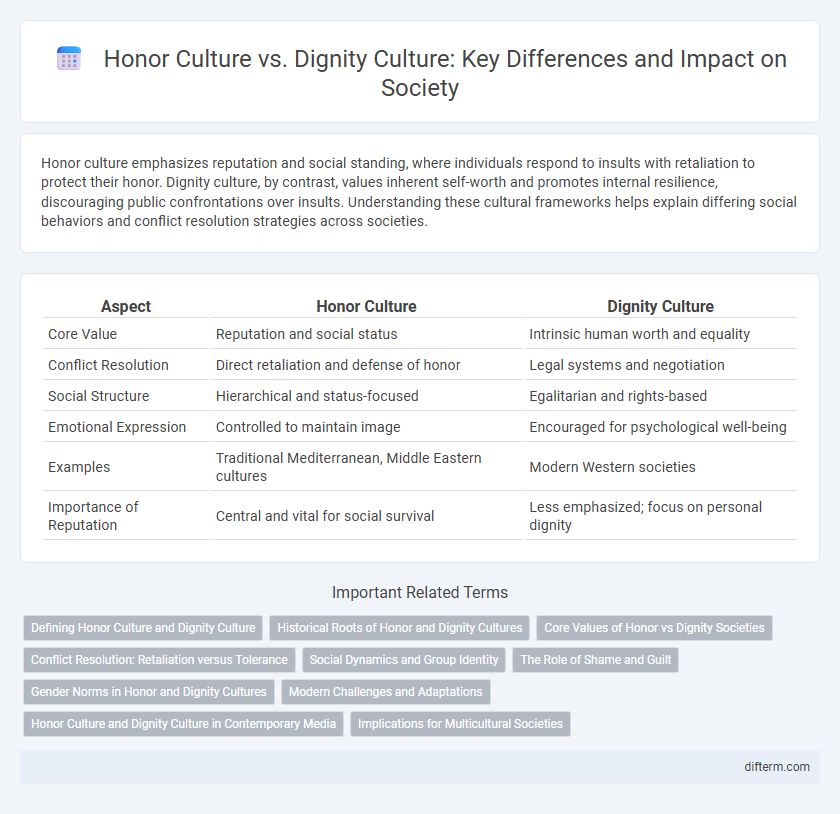Honor culture emphasizes reputation and social standing, where individuals respond to insults with retaliation to protect their honor. Dignity culture, by contrast, values inherent self-worth and promotes internal resilience, discouraging public confrontations over insults. Understanding these cultural frameworks helps explain differing social behaviors and conflict resolution strategies across societies.
Table of Comparison
| Aspect | Honor Culture | Dignity Culture |
|---|---|---|
| Core Value | Reputation and social status | Intrinsic human worth and equality |
| Conflict Resolution | Direct retaliation and defense of honor | Legal systems and negotiation |
| Social Structure | Hierarchical and status-focused | Egalitarian and rights-based |
| Emotional Expression | Controlled to maintain image | Encouraged for psychological well-being |
| Examples | Traditional Mediterranean, Middle Eastern cultures | Modern Western societies |
| Importance of Reputation | Central and vital for social survival | Less emphasized; focus on personal dignity |
Defining Honor Culture and Dignity Culture
Honor culture emphasizes reputation and social standing, where individuals protect their honor through vigilance and retaliation to perceived slights or insults. Dignity culture centers on inherent human worth, promoting internal self-respect and conflict resolution through legal or institutional means rather than personal retribution. These cultural frameworks shape social interactions, justice systems, and norms around respect and conflict management.
Historical Roots of Honor and Dignity Cultures
Honor culture historically emerged in societies where reputation and social standing were vital for survival, often rooted in tribal or kinship-based communities that valued revenge and public recognition of respect. Dignity culture developed later, particularly in Western societies influenced by Enlightenment ideals, emphasizing individual rights, intrinsic worth, and legal equality rather than collective retribution. These cultural evolutions reflect deep historical shifts from community-centered honor systems to modern frameworks prioritizing personal dignity and institutional justice.
Core Values of Honor vs Dignity Societies
Honor cultures prioritize reputation, social standing, and public perception, often emphasizing loyalty, bravery, and retribution to maintain respect within the community. Dignity cultures focus on inherent self-worth and individual rights, promoting internal values such as equality, autonomy, and respect regardless of external opinions. These core value differences influence conflict resolution, social interactions, and norms of justice, shaping distinct societal behaviors and expectations.
Conflict Resolution: Retaliation versus Tolerance
Honor culture emphasizes retaliation as a primary method of conflict resolution, where individuals respond to offenses with direct revenge to restore personal or family reputation. In contrast, dignity culture promotes tolerance and mediation, encouraging parties to resolve disputes through dialogue and legal frameworks rather than personal vengeance. This fundamental difference impacts social behavior patterns and the application of justice within communities.
Social Dynamics and Group Identity
Honor culture emphasizes reputation protection and social standing within tight-knit groups, where respect is maintained through reciprocal loyalty and public defense against threats. Dignity culture values inherent individual worth, promoting conflict resolution through institutional justice rather than personal retaliation, leading to more stable social interactions. These contrasting frameworks influence group identity by shaping behavior patterns, trust mechanisms, and responses to social challenges within communities.
The Role of Shame and Guilt
Honor culture emphasizes public reputation and social standing, with shame serving as a powerful mechanism to enforce conformity and deter behavior that might damage one's honor. Dignity culture centers on inherent self-worth, using guilt as an internal regulatory emotion to guide moral behavior and personal responsibility. The interplay of shame in honor cultures and guilt in dignity cultures shapes social interactions by influencing individuals' motivations and responses to social transgressions.
Gender Norms in Honor and Dignity Cultures
Honor cultures often enforce rigid gender norms, emphasizing male protection of family honor and female chastity, with social reputation tied closely to gendered behavior. Dignity cultures promote individual rights and equality, reducing the emphasis on strict gender roles and encouraging respect regardless of gender. These contrasting frameworks shape societal expectations and responses to gendered actions and conflicts.
Modern Challenges and Adaptations
Honor culture emphasizes reputation and social standing, often leading to reactive responses to perceived slights, whereas dignity culture prioritizes individual worth and internal self-respect, promoting conflict resolution through dialogue and legal frameworks. Modern challenges such as globalization, digital communication, and multicultural societies compel honor cultures to adapt by integrating dignity-based principles to mitigate cycles of retaliation and enhance social cohesion. This adaptation fosters resilience by balancing respect for tradition with contemporary values of equality and human rights.
Honor Culture and Dignity Culture in Contemporary Media
Honor culture, prevalent in contemporary media, often highlights themes of reputation, respect, and retaliation, reflecting societal emphasis on status and social hierarchy. In contrast, dignity culture portrays individuals as inherently valuable regardless of external perceptions, promoting internal moral frameworks and conflict resolution through dialogue rather than aggression. Media representations increasingly explore these cultural paradigms to address issues like identity, justice, and social conflict in modern societies.
Implications for Multicultural Societies
Honor culture emphasizes reputation and social standing within tight-knit groups, often leading to reactive violence when honor is perceived as threatened. Dignity culture, by contrast, values individual rights and internal self-worth, promoting conflict resolution through legal and institutional frameworks. In multicultural societies, balancing these differing cultural norms requires nuanced policies that respect diverse values while fostering social cohesion and reducing intergroup tensions.
honor culture vs dignity culture Infographic

 difterm.com
difterm.com